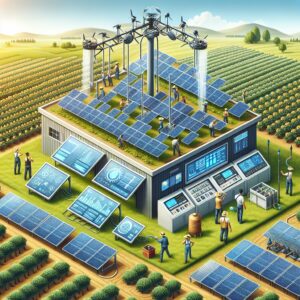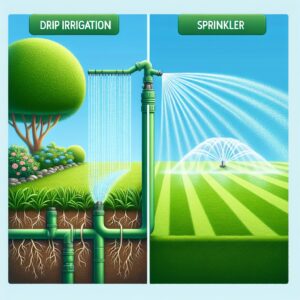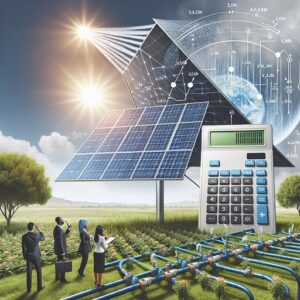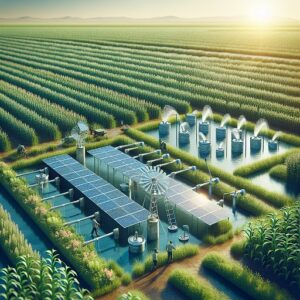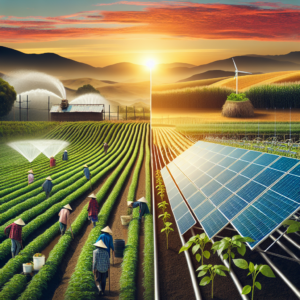
Harnessing the Sun for Growth: The Upside of Solar-Powered Irrigation
Imagine turning the sun’s rays into a steady stream of water nourishing your crops. That’s the magic of solar-powered irrigation systems. They’re not just good for the environment; they’re a smart move for your farm’s bottom line. As we explore the perks of these systems, you’ll see how they can cut costs, conserve water, and even increase your yields. It’s time to let the sun take some of the work off your shoulders.
Key Takeaways
- Solar irrigation systems can significantly reduce your energy bills, putting more money back into your pocket.
- These systems are not just cost-effective; they’re also a step towards sustainable farming, helping you conserve water and protect the environment.
- Financial incentives such as energy credits and subsidies can make the switch to solar even more beneficial for your farm’s finances.
- By choosing solar-powered irrigation, you’re opting for a low-maintenance solution that frees up time for other important farm tasks.
- Embracing solar technology can enhance your farm’s reputation as a leader in eco-friendly agriculture.

The Financial Sunshine: Cost-Effective Farming with Solar Irrigation
Let’s talk numbers. Switching to solar-powered irrigation can seem like a big investment upfront, but the savings over time are substantial. Once you’re set up, the sun’s energy is free – that means you can say goodbye to those hefty electricity bills that come with traditional irrigation systems. Plus, the efficiency of modern solar panels means they’re getting cheaper and more effective every year.
But it’s not just about the energy you’re saving; it’s also about the energy you’re generating. In many regions, farmers with solar installations can sell excess electricity back to the grid. This not only offsets the costs of installation but can also become an additional revenue stream for your farm.
And let’s not forget about durability. Solar panels are built to last, often with warranties of 25 years or more. That’s a long-term investment in lower energy costs and increased self-reliance for your farming operations.
This chart will show you the how cost-effective solar irrigation is compared to traditional irrigation.
| Aspect | Solar-Powered Irrigation | Traditional Irrigation |
|---|---|---|
| Cost | Significant reduction in energy bills, long-term financial savings, free and renewable energy source 1, 2, 3, 4 | Reliance on electricity or fuel-powered systems, escalating expenses over time 1, 2, 4 |
| Environmental Impact | Clean and renewable energy, reduces carbon footprint, minimizes ecological footprint 2, 3, 4 | Contributes to environmental concerns, high electricity bills, maintenance costs 2, 4 |
| Adaptability | Adaptable and can be installed in various terrains, overcomes geographic and infrastructure limitations 2, 3 | Limited adaptability, struggles to keep up with increasing demand for food 3 |
| Reliability | Offers a consistent and independent water supply, reduces water scarcity 2, 5 | Relies on consistent electricity or fuel supply, vulnerable to water scarcity 5 |
Long-Term Savings on Water Bills
Water is precious, especially in farming. Solar-powered irrigation systems are designed to be incredibly efficient, delivering the right amount of water exactly where and when your crops need it. This precision means less waste and, consequently, lower water bills. Over time, the savings on water can be just as significant as those on energy.
Consider this: a drip irrigation system powered by solar energy can reduce water usage by up to 50% compared to traditional methods. That’s half the water bill for the same, if not better, crop yield. It’s a win-win situation for your farm and the planet.
Energy Credits & Subsidies Boosting Farm Profits
When it comes to solar power, governments and energy companies often offer incentives to help you make the switch. These can come in the form of tax credits, rebates, and subsidies, all designed to lower the initial cost of solar panel installation.
By taking advantage of these financial incentives, you can significantly reduce the payback period for your solar irrigation system. In some cases, you could be looking at a return on investment in just a few years. After that, it’s all profit, powered by the sun.
Remember to check with your local government and energy providers to see what incentives are available in your area. These programs are not only a boon for your bank account but also a testament to the growing support for renewable energy in agriculture.
Going Green: Environmental Perks of Solar-Powered Systems

Embracing solar power isn’t just about the economics; it’s about taking care of the land that takes care of us. By choosing solar-powered irrigation, you’re reducing your farm’s carbon footprint, conserving water, and contributing to a cleaner, greener world.
Solar panels produce clean energy, which means every drop of water that nourishes your crops is delivered without burning fossil fuels. This switch reduces greenhouse gas emissions and helps combat climate change, which is a significant threat to farming worldwide.
And because solar irrigation systems are so efficient, they help prevent overwatering, reducing runoff and soil erosion. This not only protects local waterways from pollution but also preserves the quality of your soil, ensuring it remains healthy and productive for years to come.
As farmers, we’re stewards of the land, and solar-powered irrigation helps us fulfill that role in a way that’s both modern and mindful. It’s a powerful statement to make—one that resonates with consumers and can set your farm apart in a crowded market.
Reducing the Carbon ‘Footprint’ of Farming
Every time we choose a solar-powered tool over a fossil-fuel-powered one, we’re taking a step towards a cleaner farm and a healthier planet. Solar-powered irrigation systems are champions in this regard. They operate without any harmful emissions, which means your farm’s carbon ‘footprint’ shrinks with every use. This is crucial in an era where every industry is being called upon to reduce its impact on the environment.
It’s not just about the now, either. Over the long term, the cumulative effect of using solar energy can be profound. Think about it – years of irrigation without burning a single drop of diesel or using coal-powered electricity. That’s a legacy of sustainability you’re creating, one that can be felt far beyond the boundaries of your farm.
Conservation of Water Resources
Water is not just another input; it’s the lifeblood of agriculture. Solar-powered irrigation systems come with a built-in advantage: they’re typically paired with water-saving technologies like drip irrigation. This means you’re not just using the sun to power your pumps; you’re also using less water more intelligently.
By delivering water directly to the roots of your plants, you’re minimizing evaporation and runoff. This conservation effort ensures that every drop of water is used to its fullest potential, safeguarding this precious resource for future generations. Plus, you’re protecting local ecosystems by preventing water logging and salinization of the soil.

Operational Advantages: Simplifying Farm Management
Managing a farm is a complex dance of timing, labor, and resources. Solar-powered irrigation systems simplify this dance. They’re reliable, they require less hands-on management, and they’re flexible enough to adapt to the unique needs of your farm. With fewer moving parts than traditional systems, they break down less often, which means fewer interruptions to your workflow.
Low Maintenance Means More Time for Crops
One of the best things about solar-powered irrigation systems is that they’re set-and-forget. Once installed, they need very little maintenance. This reliability frees you up to focus on other critical aspects of your farm – like tending to your crops, improving your soil health, or planning for the next season. With solar, you spend less time fixing and more time growing.
Automated Watering: Precision Agriculture at Its Best
Imagine your irrigation system as a smart assistant, delivering water precisely when and where it’s needed. That’s what solar-powered systems can offer when combined with automation technologies. They can be programmed to water at the optimal times of day, reducing water loss and ensuring that plants get the hydration they need for peak growth.
This level of control is a cornerstone of precision agriculture. It allows you to optimize resources and get the best possible results from your land. Plus, with data from sensors and weather forecasts, your solar irrigation system can adjust its watering schedule in real time, reacting to the needs of your crops without any guesswork.

Yield Enhancements: How Consistent Irrigation Boosts Production
Consistency is key in farming. Plants thrive on routine, and with a solar-powered irrigation system, they get exactly that. By providing consistent and reliable watering, you can expect to see not just growth, but enhanced growth. Crops that are water-stressed can’t produce to their full potential, but with solar irrigation, water stress becomes a thing of the past.
What’s more, consistent watering can lead to earlier harvests and the ability to plan for multiple growing seasons. This can mean more produce to sell and potentially, a higher income from your farm. It’s not just about quantity, either. The quality of your crops can see a boost too, with better texture, flavor, and nutritional content – all thanks to the steady supply of water provided by your solar-powered system.
From Seedlings to Harvest: Managing Growth Cycles
Every stage of a plant’s life is crucial, from the tender seedling phase to the robust harvest season. Solar-powered irrigation systems offer unmatched control over the watering cycles, ensuring that young plants get the gentle moisture they need to establish roots, and mature plants get the deeper watering they require for growth. This precise management of growth cycles can lead to stronger, healthier plants that are better equipped to reach their full potential.
With solar irrigation, you can adjust water delivery to the specific needs of each crop and growth stage, promoting even growth and reducing the risk of disease. This level of attention to detail is what turns a good harvest into a great one.
The Impact of Reliable Watering on Crop Quality
Quality matters. In the world of farming, the quality of your produce can set you apart from the competition. Reliable watering from a solar-powered system can lead to significant improvements in the quality of your crops. Plants that receive a consistent amount of water produce fruits and vegetables that are more uniform in size, better tasting, and have a longer shelf life.
Moreover, the stress-free environment created by consistent watering can enhance the nutritional value of your produce. This not only satisfies your customers but can also command a higher price in the market, adding to your farm’s profitability.
Farming on the Frontier: Solar Solutions for Remote Areas

Remote farming locations present unique challenges, often lacking access to the electrical grid or reliable water sources. Solar-powered irrigation systems are a game-changer for these areas, providing a viable way to cultivate crops where traditional farming methods would be difficult or impossible.
Bringing Modern Farming to Off-the-Grid Locations
Solar irrigation brings the benefits of modern farming to the most isolated areas. With the sun as your power source, you can operate pumps and irrigation systems without needing to connect to the grid. This autonomy opens up new possibilities for food production in remote communities, boosting local economies and providing fresh, locally-grown produce where it’s needed most.
It’s not just about the practicalities; it’s about empowerment. Solar irrigation equips farmers with the tools to overcome the limitations of their environment, transforming previously unproductive land into thriving agricultural plots.
Overcoming Geographic and Infrastructure Limitations
Geography should not dictate a farm’s success. Solar-powered irrigation systems are adaptable and can be installed in a variety of terrains, from flat fields to sloping hillsides. They don’t require complex infrastructure, making them ideal for regions where investing in traditional irrigation would be cost-prohibitive.
With solar, you can bypass the need for expensive grid connections and water mains. Instead, you harness the sun’s energy and local water sources to create a self-sustaining irrigation system that can withstand the challenges of geography and infrastructure.
Image and Reputation: Crafting a Sustainable Brand
In today’s market, sustainability is not just a buzzword; it’s a business strategy. Adopting solar-powered irrigation can significantly enhance your farm’s image and reputation. Consumers are increasingly seeking out products that are grown in an environmentally responsible manner, and they’re willing to support farms that align with their values.
By marketing your farm as a sustainable operation, you can tap into this growing consumer base. Your commitment to solar power and water conservation can become a cornerstone of your brand, differentiating your products and potentially allowing you to charge a premium for them.
Remember, a sustainable brand is not just about the environmental benefits; it’s about the story you tell. Share your journey towards solar-powered irrigation with your customers, and let them know that by choosing your produce, they’re supporting a farm that’s investing in the future of our planet.
Marketing Benefits of Eco-Friendly Farming Practices
Going green does more than just help the planet; it helps your farm stand out. In a world where everyone is looking to make more eco-friendly choices, your commitment to solar-powered irrigation is a powerful marketing tool. It tells a story that resonates with consumers who value sustainability and are willing to support it with their wallets. This isn’t just speculation; it’s backed by a growing trend of eco-conscious consumer behavior.
So, how do you leverage this? Use your sustainable practices as a badge of honor. Highlight them on your product labels, in your advertising, and on social media. Let people know that when they buy from you, they’re supporting a farm that’s actively reducing its environmental impact. This kind of transparency builds trust and loyalty, and it can set your brand apart in a crowded marketplace.
Consumer Demand for Green Operations
Consumers are increasingly savvy about the environmental impact of the products they buy. They’re looking for brands that align with their values. This shift in consumer demand is a golden opportunity for farmers who’ve embraced solar-powered irrigation. When customers learn that your operations are powered by the sun, they see a farm that’s future-focused and responsible. That’s the kind of farm they want to support.
This demand for green operations isn’t just a niche market; it’s becoming mainstream. By meeting this demand, you’re not just doing the right thing; you’re also tapping into a market segment that can be incredibly loyal and vocal about their choices. They’ll not only buy your products but also recommend them to others, effectively becoming ambassadors for your brand.
FAQs
Let’s address some common questions about solar-powered irrigation systems. These are the queries I hear most often from farmers considering the switch to solar. The answers can help you make an informed decision for your own operations.
What are the initial costs associated with installing a solar-powered irrigation system?
The upfront costs of installing a solar-powered irrigation system can vary widely. It depends on the size of your farm and your specific needs. Generally, you’re looking at the cost of solar panels, batteries for energy storage, a pump, and possibly a controller for an automated system. While it’s true that the initial investment can be significant. It’s important to consider the long-term savings on energy and water bills, as well as potential subsidies and incentives that can offset these initial costs.
It’s best to get a customized quote from a reputable provider who can assess your farm’s unique situation and provide a detailed breakdown of the costs and expected return on investment.
Can solar irrigation systems be used in any climate?
Solar irrigation systems are incredibly versatile and can be used in a wide range of climates. The key is the sun. As long as your location receives a reasonable amount of sunlight, you can harness solar energy for irrigation. Even in less sunny areas, modern solar panels are efficient enough to capture and store energy for use on cloudier days.
Moreover, solar panels actually operate more efficiently in cooler temperatures, so a less sunny but cooler climate can still be suitable for solar irrigation. Of course, for areas with extended periods of low light, additional considerations such as larger battery storage may be necessary to ensure a consistent water supply.
How do solar-powered irrigation systems contribute to water conservation?
Solar-powered irrigation systems are a boon for water conservation efforts. Here’s how they make a difference:
- They’re often paired with drip irrigation, which delivers water directly to plant roots, reducing evaporation and runoff.
- Solar irrigation systems can be equipped with sensors and timers. This is to ensure that water is only used when necessary, avoiding overwatering.
- The precision of solar-powered systems means less water is wasted, and every drop is used effectively.
- By using renewable energy, these systems avoid the water-intensive process of energy production at power plants.
- They promote healthier plant growth, which can improve soil structure and its ability to retain water, further reducing the need for irrigation.
When you combine the efficiency of solar power with smart irrigation technology, you get a system that’s not just good for your crops, but also for the planet’s water resources.
Are there any government incentives available for adopting solar-powered irrigation?
Yes, there are often government incentives available to help offset the cost of adopting solar-powered irrigation systems. These incentives can come in various forms, such as tax credits, grants, low-interest loans, or even rebates. They’re designed to encourage farmers to invest in renewable energy sources by making the initial cost more manageable.
For instance, in the United States, the federal government offers the Investment Tax Credit (ITC). This allows you to deduct a percentage of the cost of installing a solar system from your federal taxes. Additionally, state and local governments may have their own programs with further benefits.
It’s important to do your research or consult with a financial advisor to understand the specific incentives available in your area. These programs can significantly reduce your out-of-pocket expenses and make the transition to solar irrigation much more financially attractive.
What is the lifespan of a typical solar-powered irrigation system and its components?
The lifespan of a solar-powered irrigation system is quite impressive. This is what makes it such a smart investment. Solar panels, which are the heart of the system, typically come with a warranty of 25 to 30 years. However, they can continue to function beyond that time frame, albeit at reduced efficiency.
Other components, like the inverter, may need to be replaced more frequently, generally every 10 to 15 years. Batteries used for energy storage also have varying lifespans. With proper maintenance, they can last around 5 to 15 years depending on the type and usage.
Overall, with proper installation and maintenance, a solar-powered irrigation system can provide reliable service for decades, making it a long-term investment in the sustainability and profitability of your farming operations.
In conclusion, solar-powered irrigation systems are a beacon of innovation in sustainable agriculture. They offer a range of benefits that go beyond simple cost savings, touching on environmental conservation, operational efficiency, and even marketing advantages. By investing in solar irrigation, you’re not just watering your crops; you’re nurturing the future of your farm and the planet.
So, as you consider the future of your farm, think about the role solar-powered irrigation could play. It’s an investment that pays dividends not just in dollars and cents, but in the health of your land, the quality of your produce, and the legacy you leave for future generations of farmers. Embrace the sun, and let it lead the way to a brighter, greener future for your farming endeavors.

